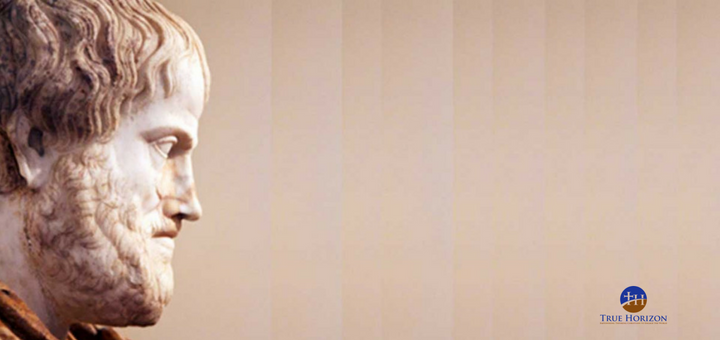Yes, We Do Need To Put God In A Box
“You can’t put God in a box!” It’s a popular saying within the Christian community. And it seems reasonable to say. After all, God can do anything He wants to do. Who would question that? I submit that every thinking Christian should question that … because it’s not true. God’s character does put him in a box. And our failure to recognize that creates a false — and therefore dangerous — picture of God. There is a box God needs to be in. And his character defines it.
God Cannot Do Whatever He Wants
God cannot do whatever he wants to do. If you think that sounds sacrilegious, you first have to understand that God cannot do things that are contrary to his nature. Before we can determine if God can do anything he wants to do, we have to first understand what that nature is. There are several elements to God’s nature but here are a few to consider.
God is Logical
God made an orderly universe. He built the laws of logic into our world and made it predictable. This is why we can communicate with one another. It’s the reason we can use science to understand how the world works. If God made the universe that way, it means that he must also be logical. It means that logic is an extension of his character. And that means God cannot do illogical things.
He can’t make a square circle, a married bachelor, or “a rock so big he can’t lift it.” This is an important point to understand as it relates to the rest of his character traits.
God is Omnipotent
God is all-powerful. But having supreme power doesn’t mean God can do anything. It means he can do anything that power can do. Being immeasurably powerful is what allows God to do miracles or create a universe as immense and complex as the one we see around us. But power does not allow God to do illogical, sinful, hateful, or unjust things. That’s an important distinction to make.
God is Goodness
God is pure goodness. He is “the final standard of good and all that God is and does is worthy of approval.” Because he is good, God is willing and able to demonstrate love in all its forms through mercy, patience, and grace. God loves everything he created. And since human beings are the pinnacle of that creation, God loves humanity in a way that we are incapable of comprehending.
God is Just
Justice occurs when someone gets exactly what they deserve. This can be positive or negative. We know that good acts deserve a reward and evil acts deserve punishment. And we know this intuitively. No one had to teach this to us. Even little babies demonstrate that they know it. All of us inherently value and seek justice. God is the source and embodiment of that idea. His character demands it. And since his character is morally perfect, any act of rebellion against that moral perfection — no matter how small — deserves to be punished.
God is Eternal and Self-Existent
God is not the type of being who needs a cause for His existence. The fact that anything exists at all means there must be a permanent, unmovable foundation that sustains it. That’s God. He is the foundation of all being. This is why the common question, “Who made God?” is so silly. God isn’t the type of thing that you make. He upholds all reality at every instant but does not need to be upheld himself.
God is Omnipresent
The fact that God upholds all reality at every instant, means that he is present everywhere. Always. He is not limited by time or space. Don’t get this confused with the idea that God is everything. That’s pantheism. God’s omnipresence means that he is present everywhere in his creation but also distinct from it.
Putting Them All Together
There are plenty of other character traits that theologians use to describe God. If you are interested in digging more deeply into these kinds of topics, I suggest investing in a book on Systematic Theology. But considering the definitions I’ve briefly mentioned here, I doubt that anyone who takes God seriously would find them to be controversial in themselves. Our problems arise when we forget that God exhibits all these character traits simultaneously. All facets of his nature have to work together. He can’t exercise one if it violates another.
Theological Inconsistencies
Focusing on one aspect of God while ignoring another invites us to accept a false view of him. And many Christians unwittingly do this all the time.
“God showed up!”
When they have an emotional experience in worship, it is common to hear some proclaim that “God showed up today!” But God doesn’t “show up” anywhere. He is always everywhere. Don’t confuse the issue. God doesn’t need our praise. And he isn’t diminished if we don’t give him praise. We need to praise him to remind ourselves of our dependence on him.
“God is so good!”
This is a common refrain to hear from someone who has just received good news of some kind. And while it’s great to acknowledge God’s blessings, it’s wrong-thinking to acknowledge them only when things are going our way. God is good regardless of our personal circumstances. It’s easy to express our love for him when things are going well for us. But it’s imperative that we do the same when things are bad.
“Where was God when … ?”
On the flip side, we seem to think God has gone missing when catastrophes occur. We assume that God’s omnipotence means he can and should destroy evil forever. But God made the loving decision to create us as free-will beings. He willingly limits his own power to give us the freedom to choose to follow him. And that means that no matter how powerful he is, God has created a world that allows us to make bad choices. The moral evil we witness all around us depends on our actions, not on God’s absence.
“God is love”
This idea is absolutely true. But contrary to the claims of the universalists and inclusivists among us, God is not just love. The idea that “God is love” is true as far as it goes, but there is more to the story. Ultimate goodness and love are different ways of describing God’s moral perfection. Being pure love and goodness means he cannot sin and he cannot lie. And that means he cannot allow moral imperfection into his presence. When our actions violate his moral law, his justice requires that there are consequences for our decisions. God’s character won’t allow him to accept whatever moral choices we make. This is a reality that often gets ignored by those who insist that a loving God would never allow us to be separated from him. The fact that God loves us does not mean he condones anything we do. And the fact that we choose to separate ourselves from him proves that he loves us enough to let us have our way.
The Box God Needs To Be In
These are just a few examples of how our failure to keep God in the proper box leads not only to theological inconsistencies but to a corrupted view of reality itself. That’s what I mean when I say that we have to put God in a box. It’s a box defined by the sum total of all the elements of his character. Isolating our favorite trait is a bad idea because it doesn’t tell the whole story. And, as is always the case, accepting bad ideas leads to bad real-world consequences.
It turns out that we better keep God in a box. And we better understand how that box is defined. It helps us avoid most of the silly, false, and even dangerous ideas that have become all too common among Christians these days. It’s not always an easy thing to do. But being clear-thinking Christianity demands that we acknowledge that God puts himself in a box. And we would do well to keep him there.
This post has also appeared on the CrossExamined.org blog





A friendly quibble:
You wrote, “God cannot do whatever he wants to do. If you think that sounds sacrilegious, you first have to understand that God cannot do things that are contrary to his nature.”
I would argue that God actually can do whatever he wants to do. He cannot do anything contrary to his nature, but he can do what he wants.
If it is in accord with his nature, then he can want it, and he can do it. If it is not in accord with his nature, he cannot want it, and he also cannot do it. The set of things that God can want to do is therefore identical with the set of things he can do. Therefore, God can do whatever he wants to do.
End of Quibble. Now for a riff on what you wrote:
The confusion that motivates these atheist challenges is this: “If we think God might want to do it, then God might want to do it, and if he can’t do it, then he’s not omnipotent.”
The further confusion that underlies this is that the atheists do not realize they are speaking literal nonsense. The “it” in these challenges isn’t just illogical (though it is that), it is completely undefined.
Let’s take a lesser example of the problem that represents. Suppose the atheist thought it a problem that God cannot create the animal universally known among English-speaking Americans for the past three decades as the guitarohippo. That’s not a problem for God because there is no such thing. It’s undefined. The atheist might as well say, “God is weak because he cannot create … … … … … … … … Oh nuts, what was I saying? I forget now. Maybe it was nothing at all.”
But it’s even worse than that with the typical challenges. God could, if he wanted, make a guitarohippo today, and 30 years from now it could be “the animal universally known … for the past three decades as the guitarohippo.” The term “guitarohippo” is undefined in current actual fact, but it is not undefined or undefinable in principle.
Of course it’s vanishingly unlikely that God would want to create a guitarohippo, and some theological perspectives would argue that God finished his creating work after the 6th day, so that settles that. But it’s at least possible that this particular Sabbath theology might be erroneous or incomplete with respect to 21st century guitarohippos. (The Bible says God “rested,” and Hebrews 4 implies that his rest is ongoing, but there’s no explicit statement telling us he would never rouse briefly from that rest.)
It’s fanciful, obviously, but it’s meant to be. The point is that while we certainly don’t expect God to do that, there’s no in-principle reason he couldn’t, as far as we know. Imagine some very strange atheist came along and said, “If there were a God, he could create a guitarohippo, and since he hasn’t, then there’s no God.” A technical answer to that would be, “God could do it, but he hasn’t. There is no contradiction in that.” (I won’t tell you what I would really think if someone said that.)
But a square circle is different. The reason God cannot make a square circle isn’t because “square circle is undefined so far,” but but because it is nonsense, undefined and undefinable in principle. Likewise with the challenge, “If God is free to do whatever he wills, then he could will to sin.” The contradiction in that thought makes it undefined, forever and in principle.
(This, by the way, is one key difference between the Muslims’ Allah and the Christians’ God. Allah is supposedly so free, he is free to contradict himself. Not so with the true God.)
The atheist who complains that God is weak because he cannot make a square circle is really saying, “God isn’t omnipotent, because he cannot … … … … … … umm… what was I saying?” That’s not a weak argument. It’s a nonexistent argument.
I fully accept your “quibble”! Good points all around, as usual.
Thanks for the feedback!